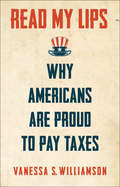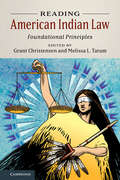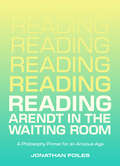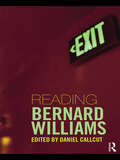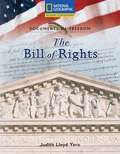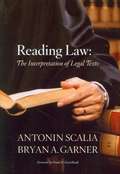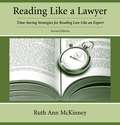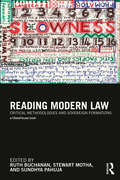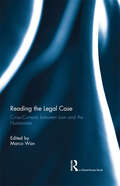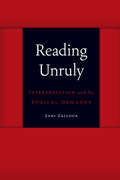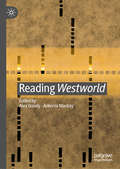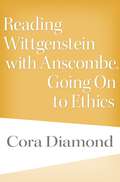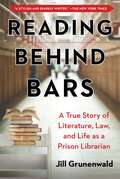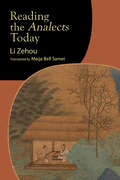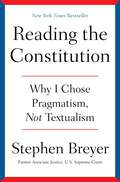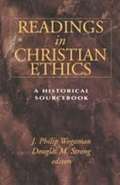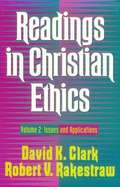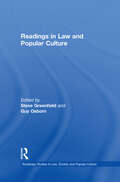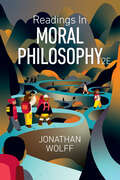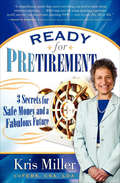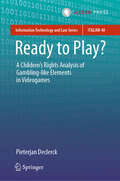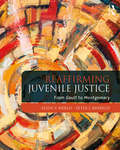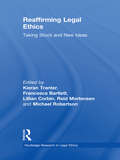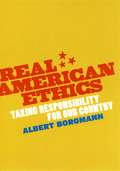- Table View
- List View
Read My Lips: Why Americans Are Proud to Pay Taxes
by Vanessa S. WilliamsonConventional wisdom holds that Americans hate taxes. But the conventional wisdom is wrong. Bringing together national survey data with in-depth interviews, Read My Lips presents a surprising picture of tax attitudes in the United States. Vanessa Williamson demonstrates that Americans view taxpaying as a civic responsibility and a moral obligation. But they worry that others are shirking their duties, in part because the experience of taxpaying misleads Americans about who pays taxes and how much. Perceived "loopholes" convince many income tax filers that a flat tax might actually raise taxes on the rich, and the relative invisibility of the sales and payroll taxes encourages many to underestimate the sizable tax contributions made by poor and working people.Americans see being a taxpayer as a role worthy of pride and respect, a sign that one is a contributing member of the community and the nation. For this reason, the belief that many Americans are not paying their share is deeply corrosive to the social fabric. The widespread misperception that immigrants, the poor, and working-class families pay little or no taxes substantially reduces public support for progressive spending programs and undercuts the political standing of low-income people. At the same time, the belief that the wealthy pay less than their share diminishes confidence that the political process represents most people.Upending the idea of Americans as knee-jerk opponents of taxes, Read My Lips examines American taxpaying as an act of political faith. Ironically, the depth of the American civic commitment to taxpaying makes the failures of the tax system, perceived and real, especially potent frustrations.
Reading American Indian Law: Foundational Principles
by Melissa L. Tatum Grant ChristensenThe study of American Indian law and policy usually focuses on federal statutes and court decisions, with these sources forming the basis for most textbooks. Virtually ignored is the robust and growing body of scholarly literature analyzing and contextualizing these primary sources. Reading American Indian Law is designed to fill that void. Organized into four parts, this book presents 16 of the most impactful law review articles written during the last three decades. Collectively, these articles explore the core concepts underlying the field: the range of voices including those of tribal governments and tribal courts, the role property has played in federal Indian law, and the misunderstandings between both people and sovereigns that have shaped changes in the law. Structured with flexibility in mind, this book may be used in a wide variety of classroom settings including law schools, tribal colleges, and both graduate and undergraduate programs.
Reading Arendt in the Waiting Room: A Philosophy Primer for an Anxious Age
by Jonathan FoilesAnxiety may be the defining feeling of our current era, and though it affects many people on a deeply personal level, the last few years have also witnessed the rise of more communal feelings of dread and unknowing, problems that sometimes seem too bi
Reading Bernard Williams
by Daniel CallcutWhen Bernard Williams died in 2003, the Times newspaper hailed him ‘as the greatest moral philosopher of his generation’. This outstanding collection of specially commissioned new essays on Williams's work is essential reading for anyone interested in Williams, ethics and moral philosophy and philosophy in general.Reading Bernard Williams examines the astonishing scope of his philosophy from metaphysics and philosophy of mind to ethics, political philosophy and the history of philosophy. An international line up of outstanding contributors discuss, amongst others, the following central aspects of Williams's work: Williams's challenge to contemporary moral philosophy and his criticisms of 'absolute' theories of morality reason and rationality the good life the emotions Williams and the phenomenological tradition philosophical and political agency moral and political luck ethical relativism Contributors : Simon Blackburn; John Cottingham; Frances Ferguson; Joshua Gert; Peter Goldie; Charles Guignon; Sharon Krause; Christopher Kutz; Daniel Markovits; Elijah Millgram; Martha Naussbaum; Carol Rovane
Reading Expeditions (Social Studies: The Bill of Rights 1st Edition
by Judith Lloyd Yero National Geographic Learning StaffLearn the history behind the first ten amendments to the U. S. Constitution. See how the Bill of Rights guarantees Americans five basic freedoms (speech, press, religion, assembly, and petition) and protects the rights of the accused.
Reading Law: The Interpretation of Legal Texts
by Bryan A. Garner Antonin ScaliaIn this groundbreaking book, Scalia and Garner systematically explain all the most important principles of constitutional, statutory, and contractual interpretation in an engaging and informative style with hundreds of illustrations from actual cases. Is a burrito a sandwich? Is a corporation entitled to personal privacy? If you trade a gun for drugs, are you using a gun in a drug transaction? The authors grapple with these and dozens of equally curious questions while explaining the most principled, lucid, and reliable techniques for deriving meaning from authoritative texts. Meanwhile, the book takes up some of the most controversial issues in modern jurisprudence. What, exactly, is textualism? Why is strict construction a bad thing? What is the true doctrine of originalism? And which is more important: the spirit of the law, or the letter? The authors write with a well-argued point of view that is definitive yet nuanced, straightforward yet sophisticated.
Reading Like a Lawyer: Time-Saving Strategies for Reading Law Like an Expert
by Ruth Ann McKinneyThe ability to read law well is an indispensable skill that can make or break the academic career of any aspiring lawyer. Fortunately, the ability to read law well (quickly and accurately) is a skill that can be acquired through knowledge and practice. First published in 2005, Reading Like a Lawyer has become a staple on many law school reading lists for prospective and admitted students. The second edition includes the same critical reasoning and reading strategies, accompanied by hands-on practice exercises, that made the first edition such a success. It adds a valuable new chapter on a growing challenge for this generation of legal readers: how to read material that is presented on a screen with maximum efficiency and effectiveness.
Reading Modern Law: Critical Methodologies and Sovereign Formations
by Stewart Motha Ruth Buchanan Sundhya PahujaReading Modern Law identifies and elaborates upon key critical methodologies for reading and writing about law in modernity. The force of law rests on determinate and localizable authorizations, as well as an expansive capacity to encompass what has not been pre-figured by an order of rules. The key question this dynamic of law raises is how legal forms might be deployed to confront and disrupt injustice. The urgency of this question must not eclipse the care its complexity demands. This book offers a critical methodology for addressing the many challenges thrown up by that question, whilst testifying to its complexity. The essays in this volume - engagements direct or oblique, with the work of Peter Fitzpatrick - chart a mode of resisting the proliferation of social scientific methods, as much as geo-political empire. The authors elaborate a critical and interdisciplinary treatment of law and modernity, and outline the pivotal role of sovereignty in contemporary formations of power, both national and international. From various overlapping vantage points, therefore, Reading Modern Law interrogates law's relationship to power, as well as its relationship to the critical work of reading and writing about law in modernity.
Reading The Legal Case: Cross-Currents between Law and the Humanities
by Marco WanThis volume examines the nature, function, development and epistemological assumptions of the legal case in an interdisciplinary context. Using the question of ‘reading’ as a guiding principle, it opens up new ways of understanding case law and the doctrine of precedent by bringing the law into dialogue with the humanities. What happens when a legal case is read not only by lawyers, but by literary critics, by linguists, by philosophers, or by historians? How do film makers and writers adapt and transform legal cases in their work? How might one interpret fiction in the context of the historical development of the common law? The essays in this volume test the boundaries of the legal case as a genre by inviting perspectives from other disciplines, and in doing so also raise more fundamental questions of what constitutes law and legal thinking. This book will be of interest to anyone seeking a better understanding of the common law, the humanities, and the intersection between them.
Reading Unruly: Interpretation and Its Ethical Demands (Symploke Studies in Contemporary Theory)
by Zahi ZallouaDrawing on literary theory and canonical French literature, Reading Unruly examines unruliness as both an aesthetic category and a mode of reading conceived as ethical response. Zahi Zalloua argues that when faced with an unruly work of art, readers confront an ethical double bind, hesitating then between the two conflicting injunctions of either thematizing (making sense) of the literary work, or attending to its aesthetic alterity or unreadability. Creatively hesitating between incommensurable demands (to interpret but not to translate back into familiar terms), ethical readers are invited to cultivate an appreciation for the unruly, to curb the desire for hermeneutic mastery without simultaneously renouncing meaning or the interpretive endeavor as such. Examining French texts from Montaigne’s sixteenth-century Essays to Diderot’s fictional dialogue Rameau’s Nephew and Baudelaire’s prose poems The Spleen of Paris, to the more recent works of Jean-Paul Sartre’s Nausea, Alain Robbe-Grillet’s Jealousy, and Marguerite Duras’s The Ravishing of Lol Stein, Reading Unruly demonstrates that in such an approach to literature and theory, reading itself becomes a desire for more, an ethical and aesthetic desire to prolong rather than to arrest the act of interpretation.
Reading Westworld
by Alex Goody Antonia MackayReading Westworld is the first volume to explore the cultural, textual and theoretical significance of the hugely successful HBO TV series Westworld. The essays engage in a series of original enquiries into the central themes of the series including conceptions of the human and posthuman, American history, gaming, memory, surveillance, AI, feminism, imperialism, free will and contemporary capitalism. In its varied critical engagements with the genre, narratives and contexts of Westworld, this volume explores the show’s wider and deeper meanings and the questions it poses, as well considering how Westworld reflects on the ethical implications of artificial life and technological innovation for our own futurity. With critical essays that draw on the interdisciplinary strengths and productive intersections of media, cultural and literary studies, Reading Westworld seeks to respond to the show’s fundamental question; “Have you ever questioned the nature of your reality?” It will be of interest to students, academics and general readers seeking to engage with Westworld and the far-reaching questions it poses about our current engagements with technology.
Reading Wittgenstein with Anscombe, Going On to Ethics
by Cora DiamondCora Diamond follows two major philosophers as they think about thinking, and about our ability to respond to thinking that has gone astray. Acting as both witness to and participant in the encounter, she provides fresh perspective on the value of Wittgenstein’s and Anscombe’s work, and demonstrates what genuinely independent thought can achieve.
Reading behind Bars: A True Story of Literature, Law, and Life as a Prison Librarian
by Jill GrunenwaldIn December 2008, twentysomething Jill Grunenwald graduated with her master’s degree in library science, ready to start living her dream of becoming a librarian. But the economy had a different idea. As the Great Recession reared its ugly head, jobs were scarce. After some searching, however, Jill was lucky enough to snag one of the few librarian gigs left in her home state of Ohio. The catch? The job was behind bars as the prison librarian at a men’s minimum-security prison. Talk about baptism by fire. As an untested twentysomething woman, to say that the job was out of Jill’s comfort zone was an understatement. She was forced to adapt on the spot, speedily learning to take the metal detectors, hulking security guards, and colorful inmates in stride. Over the course of a little less than two years, Jill came to see past the bleak surroundings and the orange jumpsuits and recognize the humanity of the men stuck behind bars. They were just like every other library patron—persons who simply wanted to read, to be educated and entertained through the written word. By helping these inmates, Jill simultaneously began to recognize the humanity in everyone and to discover inner strength that she never knew she had. At turns poignant and hilarious, Reading behind Bars is a perfect read for fans of Orange is the New Black and Shakespeare Saved My Life.
Reading the Analects Today (SUNY series, Translating China)
by Zehou LiOne of China's most prominent contemporary philosophers reads and comments on one of the central texts in the Chinese philosophical tradition.In this book, one of contemporary China's most prominent philosophers, Li Zehou, explores one of the central texts in the Chinese philosophical tradition, the Analects of Confucius. While the book provides an introduction to the Analects itself and to Confucianism in general, it also serves as an introduction to Li's own thought, particularly the ways in which he regarded the Confucian tradition as relevant to postrevolutionary contemporary China. Key topics include the role of Confucianism in the Chinese tradition and in contemporary China; Confucianism's quasi-religious, quasi-philosophical character; Li's views on emotion, morality, and fate in Confucianism; and his call for a separation of public social morality from private religious morality in modern China. Translated here by Maija Bell Samei, Reading the "Analects" Today is among the most accessible of Li Zehou's works and will be of interest not only to philosophers but to scholars and students of both modern and traditional Chinese intellectual, social, and religious history.
Reading the Constitution: Why I Chose Pragmatism, Not Textualism
by Stephen BreyerNew York Times Bestseller In a provocative and brilliant analysis, retired Supreme Court Justice Stephen Breyer deconstructs the textualist philosophy of the current Supreme Court&’s supermajority and makes the case for a more pragmatic approach of the Constitution. &“You will not read a more important legal work this election year.&” —Bob Woodward, Washington Post reporter and author of fifteen #1 New York Times bestselling books &“A dissent for the ages.&” —The Washington Post &“Breyer&’s candor about the state of the court is refreshing and much needed.&” —The Boston GlobeThe relatively new judicial philosophy of textualism dominates the Supreme Court. Textualists claim that the right way to interpret the Constitution and statutes is to read the text carefully and examine the language as it was understood at the time the documents were written. This, however, is not Justice Breyer&’s philosophy nor has it been the traditional way to interpret the Constitution since the time of Chief Justice John Marshall. Justice Breyer recalls Marshall&’s exhortation that the Constitution must be a workable set of principles to be interpreted by subsequent generations. Most important in interpreting law, says Breyer, is to understand the statutes as well as the consequences of deciding a case one way or another. He illustrates these principles by examining some of the most important cases in the nation&’s history, among them the Dobbs and Bruen decisions from 2022 that he argues were wrongly decided and have led to harmful results.
Readings in Christian Ethics: A Historical Sourcebook
by J. Philip Wogaman Douglas M. StrongReadings in Christian Ethics presents in one volume the most consequential ethical writings from the earliest days of Christianity through the late twentieth century. Introductory material for each selection is provided to help set each piece in its proper historical and social context.
Readings in Christian Ethics: Issues and Applications (Volume #2)
by David K. Clark Robert V. RakestrawWhat happens when ethical interpretations meet life? Readings sample divergent views on moral issues. Readers can work through case studies.
Readings in Law and Popular Culture (Routledge Studies in Law, Society and Popular Culture)
by Guy Osborn Steven GreenfieldReadings in Law and Popular Culture is the first book to bring together high quality research, with an emphasis on context, from key researchers working at the cutting-edge of both law and cultural disciplines. Fascinating and varied, the volume crosses many boundaries, dealing with areas as diverse as football-based computer games, Buffy the Vampire Slayer, digital sampling in the music industry, the films of Sidney Lumet, football hooliganism, and Enid Blyton. These topics are linked together through the key thread of the role of, or the absence of, law - therefore providing a snapshot of significant work in the burgeoning field of law and popular culture. Including important theoretical and truly innovative, relevant material, this contemporary text will enliven and inform a legal audience, and will also appeal to a much broader readership of people interested in this highly topical area.
Readings in Moral Philosophy (Second Edition)
by Jonathan WolffAn accessible, diverse collection designed to captivate students from all backgrounds. Jonathan Wolff’s Readings in Moral Philosophy is a thoughtfully curated and exceptionally diverse collection of readings on ethical theory and contemporary moral issues. Used on its own or as a companion to the author’s An Introduction to Moral Philosophy, Readings in Moral Philosophy strikes an ideal balance between readings on the basics of moral theory, readings on perennial moral debates, and readings on fascinating topics at the cutting edge of applied ethics. With a wide-ranging table of contents, robust pedagogical support, and an affordable price, the Second Edition provides exceptional value to moral philosophy courses. This purchase offers access to the digital ebook only.
Ready for Pretirement: 3 Secrets for Safe Money and a Fabulous Future
by Kris MillerA little planning goes a long way—prepare for a more secure financial future with this practical, proactive guide that &“will help you sleep at night&” (Sam Horn, author of Pop!). Retirement planning can be scary, confusing, and overwhelming—especially if you wait until you&’re faced with a family medical emergency. It is during these unexpected situations that people often make foolish decisions because of the stress and pressure to make a quick choice. Stop procrastinating and get started now with the tools included in this guide. Older people can face pressing financial planning issues related to age and health—that&’s why retirement planning isn&’t just for seniors. Author Kris Miller taps into her vast estate planning experience and explains why you should get started now—even if you&’re only in your twenties or thirties. Learn how to create a Living Will and a Living Trust; make sure your family is cared for; build wealth; protect your assets from sky-high medical expenses; and retire happy. Ready For Pretirement provides an easy-to-understand overview of the financial decisions that need to be made. From writing a will to creating a trust, from the proper way to hold property to selecting low-risk investments, this book provides necessary guidance—so when you&’re ready to plunge into your golden years, you can do it with peace of mind.
Ready to Play?: A Children’s Rights Analysis of Gambling-like Elements in Videogames (Information Technology and Law Series #40)
by Pieterjan DeclerckThis book approaches &‘gambling-like elements&’ such as lootboxes and social casino games from a children&’s rights perspective, focusing on the applicable existing legal framework and providing recommendations for future regulation. Analysed legal domains include gambling regulation, consumer protection and data protection regulation, as well as videogame industry self-regulation. An interdisciplinary approach serves as the foundation of the text; insights from non-legal disciplines such as psychology and media studies are integrated into the legal analysis. The book is aimed at readers with different levels of prior knowledge and experience regarding the topic, by providing both step-by-step explanations of videogame-related concepts and in-depth legal discussions within the various legal domains at different levels. It examines the recent evolution where children are increasingly engaging with a changing videogame environment in which the lines between videogames and gambling are blurred. By adopting a children&’s rights perspective, the book aims to add a fresh perspective to the legal debate related to the interacting worlds of videogames and gambling. As the book was written based on the doctoral research of the author, one especially relevant aspect is the inclusion of recommendations and wider suggestions directed at a variety of stakeholders in the field, ranging from policymakers at different levels, to industry representatives, legal scholars, parents and carers. Pieterjan Declerck is a Doctor in Law and is affiliated to the Department of Law and Technology at the Faculty of Law and Criminology at Ghent University in Belgium.
Reaffirming Juvenile Justice: From Gault to Montgomery
by Alida V. Merlo Peter J. BenekosThis book will expand students’ knowledge and understanding of the evolution of juvenile justice in the last 50 years. Designed to coincide with the 50th anniversary of the landmark case In re Gault, which the U.S. Supreme Court decided in 1967, the authors provide a brief history of juvenile justice, then frame the developments and transformations that have occurred in the intervening years. Topics covered include an overview of the dramatic changes to the field following the spike in youth violence in the 1990s, the "superpredator" myth, zero-tolerance policies, and sanctions for juvenile offenders—particularly the 2005 abolition of the death penalty and subsequent decision on life without parole. The book also covers child and youth victimization and trauma, and recent prevention and treatment initiatives. Designed for upper-level undergraduates, this text reflects on the evolving U.S. juvenile justice system while anticipating future challenges and trends. Reaffirming Juvenile Justice illustrates how ideology, media, and politics shape policy and how it can evolve.
Reaffirming Legal Ethics: Taking Stock and New Ideas (Routledge Research in Legal Ethics)
by Kieran TranterIt has been over thirty years since the founding crises that birthed legal ethics as both a field of study and a discrete field of law. In that time thinking about the ethical dimension of legal practice has taken several turns: from justifications of zealous advocacy, to questions of process and connections to specifically legal values, to more recently consideration of legal conduct as part of a wider field of virtue. Parallel to this dynamism of thought, there has also been significant changes in how legal professions, especially within those that possess a common law heritage, have been regulated and the values and conceptions of legitimate conduct that has informed this regulation. This volume represents an opportunity for a comprehensive review of legal ethics as an international movement. Contributors include many of the key participants to the legal ethics field from the United States, United Kingdom, Canada, Australia, New Zealand and South Africa, including David Luban and Deborah Rhode, as well as many of the recognised emerging thinkers. The theme of the book is taking stock of the last thirty years of legal ethics practice and scholarship and also a forum for new ideas and new thinking regarding the conduct of lawyers and the moral and social responsibility of the legal profession. The contributions also consider the topic of dynamism. Over the last decade significant developments in both the expectations of professional conduct and the regulation of the profession has been experienced in all jurisdictions, which has seen traditional, and once sacred, conceptions of lawyering challenged and re-evaluated. The contributors also look at the theme of affirmation. Within an increasingly complex environment of change and dynamism, this volume reaffirms that there is value within the field of legal ethics. That is the project of reflecting on the unique ethical and conduct requirements of lawyering can not be submerged into a broader field of applied philosophy, management or regulatory studies. While this volume does not deny the opportunities that exist for interdisciplinary engagement with philosophy, social science or politics, it affirms legal ethics as a legitimate and highly relevant field of inquiry.
Real American Ethics: Taking Responsibility for Our Country
by Albert BorgmannAmerica is a wonderful and magnificent country that affords its citizens the broadest freedoms and the greatest prosperity in the world. But it also has its share of warts. It is embroiled in a war that many of its citizens consider unjust and even illegal. It continues to ravage the natural environment and ignore poverty both at home and abroad, and its culture is increasingly driven by materialism and consumerism. But America, for better or for worse, is still a nation that we have built. So why then, asks Albert Borgmann in this most timely and urgent work, are we failing to take responsibility for it? In Real American Ethics, Borgmann asks us to reevaluate our role in the making of American values. Taking his cue from Winston Churchill—who once observed that we shape our buildings, and then our buildings shape us—Borgmann considers the power of our most enduring institutions and the condition of our present moral makeup to propose inspired new ways in which we, as ordinary citizens, can act to improve our country. This, he shows, includes everything from where we choose to live and what we spend our money on to daunting tasks like the reshaping of our cities—habits and actions that can guide us to more accomplished and virtuous lives. Using prose that is easy and direct throughout, Borgmann’s position is grounded neither by conservative nor liberal ideology, but in his understanding that he is a devoted citizen among many. In an age in which the blame game is the only game in town, this patriotic book is an eloquent reminder of the political strength we all wield when we work together.
Real American Ethics: Taking Responsibility for Our Country
by Albert BorgmannAmerica is a wonderful and magnificent country that affords its citizens the broadest freedoms and the greatest prosperity in the world. But it also has its share of warts. It is embroiled in a war that many of its citizens consider unjust and even illegal. It continues to ravage the natural environment and ignore poverty both at home and abroad, and its culture is increasingly driven by materialism and consumerism. But America, for better or for worse, is still a nation that we have built. So why then, asks Albert Borgmann in this most timely and urgent work, are we failing to take responsibility for it? In Real American Ethics, Borgmann asks us to reevaluate our role in the making of American values. Taking his cue from Winston Churchill—who once observed that we shape our buildings, and then our buildings shape us—Borgmann considers the power of our most enduring institutions and the condition of our present moral makeup to propose inspired new ways in which we, as ordinary citizens, can act to improve our country. This, he shows, includes everything from where we choose to live and what we spend our money on to daunting tasks like the reshaping of our cities—habits and actions that can guide us to more accomplished and virtuous lives. Using prose that is easy and direct throughout, Borgmann’s position is grounded neither by conservative nor liberal ideology, but in his understanding that he is a devoted citizen among many. In an age in which the blame game is the only game in town, this patriotic book is an eloquent reminder of the political strength we all wield when we work together.
